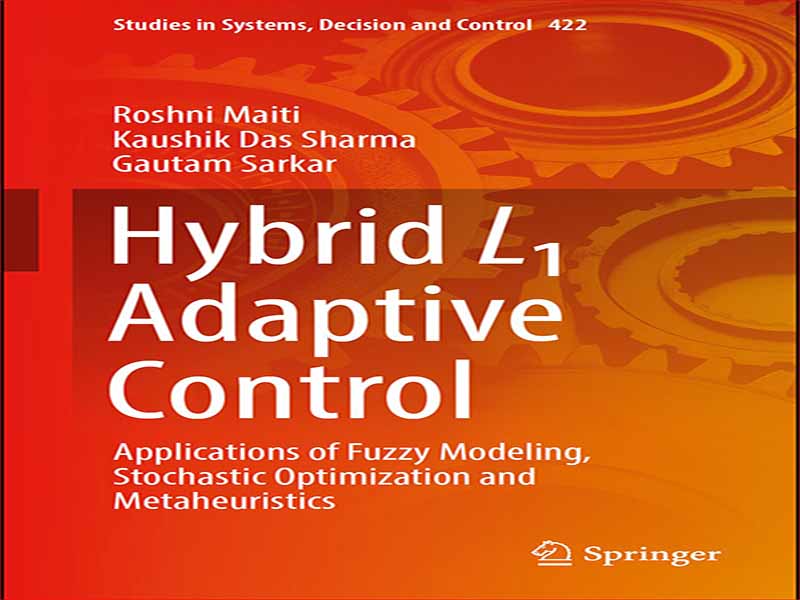- عنوان: Hybrid L1 Adaptive Control / Applications of Fuzzy Modeling, Stochastic Optimization and Metaheuristics
- نویسنده: Roshni-Maiti,-Kaushik-Das-Sharma,-Gautam-Sarkar
- حوزه: مدل سازی فازی
- سال انتشار: 2022
- تعداد صفحه: 263
- زبان اصلی: انگلیسی
- نوع فایل: pdf
- حجم فایل: 16.9 مگابایت
روشهای کنترل مرسوم، به عنوان مثال، کنترلکننده مشتق انتگرال متناسب (PID)، تنظیمکننده درجه دوم خطی (LQR) و غیره، میتوانند سیستمهای تغییرناپذیر زمان خطی (LTI) را کنترل کنند. اگرچه، عملکرد آنها زمانی که غیرخطیها، عدم قطعیتهای متغیر زمانی، اختلالات متغیر زمانی کاهش مییابد، کاهش مییابد. ، تاخیرها و غیره در سیستم وجود دارد. کنترلکنندههای تطبیقی برای مقابله با عدم قطعیتها و اختلالات زمانی ایجاد میشوند. پرکاربردترین طرح کنترل تطبیقی، به عنوان مثال، مدل مرجع AdaptiveController (MRAC) از بهره انطباق کم برای حفظ استحکام استفاده می کند. از این رو، MRAC دارای عملکرد گذرا کندی است. با هدف غلبه بر چنین مشکلی، کنترل کننده تطبیقی L1 برای ارائه عملکرد گذرا سریع با استحکام بالا معرفی شد. با این حال، عملکرد کنترلکننده تطبیقی پایه L1 زمانی که غیرخطیها، تاخیرها و غیره در سیستم وجود دارند، کاهش مییابد. از سوی دیگر، غیرخطیها را میتوان بهدرستی از طریق منطق فازی تقریبی جهانی مدلسازی کرد. علاوه بر این، پارامترهای کنترلکنندهها را میتوان با استفاده از تکنیکهای مختلف بهینهسازی تصادفی و فراابتکاری برای اطمینان از عملکرد بهینه انتخاب کرد. تعدادی از طرحهای طراحی کنترلکننده را میتوان برای کنترل سیستمهای عملی ترکیب کرد که شامل غیرخطیها، عدم قطعیتهای متغیر زمانی، اختلالات، اتصالات متقابل، دینامیک مدلنشده، تاخیرها و غیره به طور همزمان است. این کتاب به طراحی استراتژیهای کنترل ترکیبی برای کنترل سیستمهای عملی حاوی عدم قطعیتهای متغیر زمانی، اغتشاشات، غیرخطیها، پارامترهای ناشناخته، دینامیک مدلنشده، تاخیرها و غیره به طور همزمان میپردازد. در این کتاب، مزایای کنترلکنندههای مختلف برای تولید عملکرد کنترل برتر برای سیستمهای عملی گرد هم آمده است. با آگاهی از مزایای کنترل کننده تطبیقی برای مقابله با ثابت ناشناخته، عدم قطعیت های متغیر با زمان و اغتشاشات متغیر زمان، یک کنترل کننده تطبیقی جدید اختراع شده، یعنی کنترل کننده تطبیقی L1 با استراتژی های دیگر ترکیب شده است. پارامترهای کنترل کننده تطبیقی L1 باید به طور معقول انتخاب شوند تا تعادل مناسب بین عملکرد گذرا خوب و استحکام بالا حفظ شود.
Conventional control methodologies, viz., Proportional Integral Derivative (PID) controller, Linear Quadratic Regulator (LQR), etc., can control Linear Time Invariant (LTI) systems.Though, their performances degrade when nonlinearities, time varying uncertainties, time varying disturbances, delays, etc., present into the system. Adaptive controllers arise to tackle time varying uncertainties and disturbances. The most extensively used adaptive control scheme, viz.,Model Reference AdaptiveController (MRAC) utilizes low adaptation gain to maintain robustness. Hence, MRAC possess sluggish transient performance.With the aim to overcome such problem, L1 adaptive controller was introduced to provide fast transient performance with high robustness. However, the performance of basic L1 adaptive controller degrades when nonlinearities, delays, etc., are present in the system. On the other hand, nonlinearities can be properly modelled through universal approximator fuzzy logic. Moreover, the parameters of the controllers can be chosen by employing different stochastic optimization and metaheuristics techniques to assure optimal performance. A number of controller designing schemes can be hybridized to control practical systems consist of nonlinearities, time varying uncertainties, disturbances, cross-couplings, unmodelled dynamics, delays, etc., simultaneously. This book deals with the designing of hybrid control strategies to control practical systems containing time varying uncertainties, disturbances, nonlinearities, unknown parameters, unmodelled dynamics, delays, etc., concurrently. In this book, the advantages of different controllers are brought together to produce superior control performance for the practical systems. Being aware of the advantages of adaptive controller to tackle unknownconstant, time varying uncertainties and time varying disturbances, a newly invented adaptive controller, namely L1 adaptive controller is hybridized with other strategies. The parameters of L1 adaptive controller should be chosen sensibly to maintain proper balance between good transient performance and high robustness.
این کتاب را میتوانید بصورت رایگان از لینک زیر دانلود نمایید.
Download: Hybrid L1 Adaptive Control



































نظرات کاربران